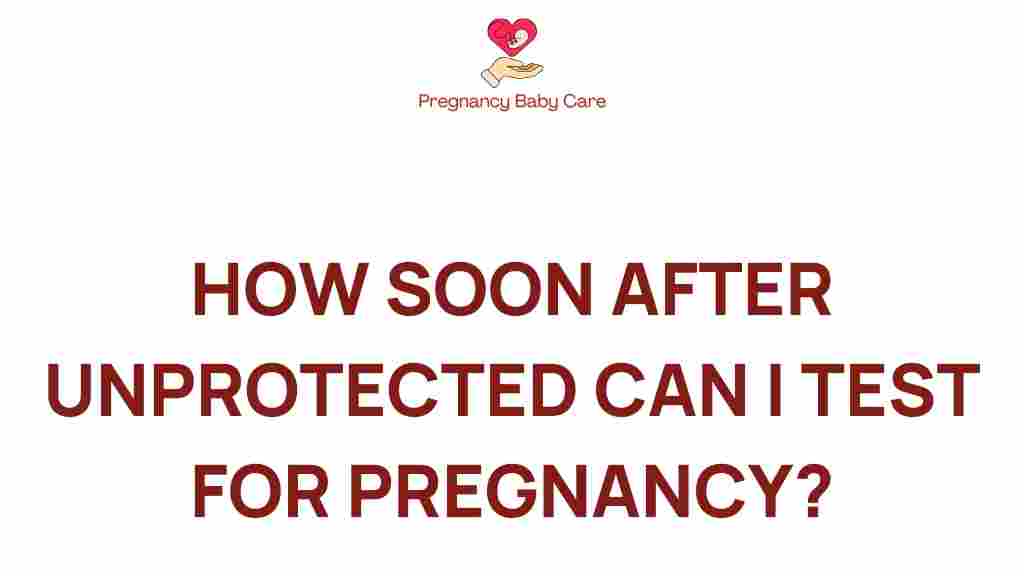The Timely Question: When Can You Test for Pregnancy After Unprotected Sex?
Understanding when to take a pregnancy test after unprotected sex is crucial for those who are actively trying to conceive or want to avoid an unplanned pregnancy. The question often arises: how soon can you test for pregnancy? In this article, we will explore the best times for testing, the methods available, and factors that influence hormone levels, conception, and your menstrual cycle.
Understanding Pregnancy and Hormone Levels
Pregnancy begins with conception, which occurs when a sperm fertilizes an egg. This usually happens within 24 hours of ovulation. After conception, the body starts producing the hormone human chorionic gonadotropin (hCG). It’s this hormone that pregnancy tests detect.
hCG levels rise rapidly in the early stages of pregnancy. For effective early detection, knowing when to test is key. Testing too early can lead to inaccurate results due to low hormone levels.
Timing Your Pregnancy Test
After unprotected sex, the timing of your pregnancy test will depend on several factors, including your menstrual cycle and ovulation timing.
- Menstrual Cycle: Knowing your cycle is fundamental. If you have a regular cycle, ovulation typically occurs around 14 days before your next period.
- Implantation: After fertilization, the embryo travels to the uterus and implants itself, which typically occurs 6-10 days after conception.
- hCG Production: Once implantation occurs, hCG begins to enter your bloodstream and urine, but it takes time for levels to become detectable.
When to Take a Pregnancy Test
For the most accurate results, follow these guidelines:
- 1. Wait Until Your Missed Period: The best time to take a pregnancy test is after your missed period. This usually gives enough time for the hCG levels to rise.
- 2. Testing Before Your Missed Period: If you’re eager to know sooner, some sensitive pregnancy tests can detect hCG as early as 4-5 days before your expected period. However, results may not be reliable.
- 3. Early Detection Tests: Certain home tests are designed for early detection. They claim to detect pregnancy hormones earlier but may still yield false negatives. Always check the packaging for specifics.
Home Tests vs. Laboratory Tests
There are two primary methods for testing for pregnancy: home pregnancy tests (HPTs) and laboratory tests.
Home Pregnancy Tests
Home tests are convenient and can be done in privacy. Here’s what you need to know:
- Types: Most home tests are urine tests that detect hCG levels.
- Usage: Follow the instructions carefully, usually involving urinating on a test strip or placing a drop of urine in a test cup.
- Timing: For best results, test in the morning when urine is most concentrated.
Laboratory Tests
Laboratory tests can be done at a doctor’s office and can provide more accurate results. Here are some advantages:
- Blood Tests: A blood test can detect pregnancy earlier than a home test and measure the exact hCG levels.
- Sensitivity: Laboratory tests are more sensitive, meaning they can confirm pregnancy at lower hormone levels.
Factors Influencing Test Results
Several factors can affect the accuracy of your pregnancy test results:
- Timing of the Test: Testing too early after unprotected sex can lead to false negatives.
- Hormone Levels: Individual hormone levels vary; some women may take longer to produce detectable hCG.
- Medications: Certain medications, especially those containing hCG, can affect test results.
- Testing Method: Using a test that is not sensitive enough or not following the instructions can lead to inaccurate results.
Troubleshooting Tips for Pregnancy Testing
If you receive a negative result but still suspect you may be pregnant, consider these troubleshooting tips:
- Wait a Few Days: If you tested early, wait a few days and test again.
- Check Test Expiry: Ensure the test hasn’t expired, as this can affect accuracy.
- Follow Instructions: Make sure you followed the instructions exactly as stated on the packaging.
- Consult a Doctor: If in doubt, or if your period is late and you still test negative, consult a healthcare provider for a blood test.
Understanding Your Menstrual Cycle
Your menstrual cycle plays a significant role in determining when you can test for pregnancy. Here’s a brief overview:
- Day 1: First day of your period.
- Ovulation: Typically occurs around day 14 in a 28-day cycle.
- Fertilization: The egg can be fertilized within 24 hours of ovulation.
- Implantation: Occurs about 6-10 days after fertilization, which is when hCG starts to be produced.
By understanding this cycle, you can better determine the optimal time for testing after unprotected sex.
Conclusion
Knowing when to test for pregnancy after unprotected sex is essential for those looking to confirm conception or avoid an unplanned pregnancy. The best practice is to wait until after your missed period for the most accurate results. However, if you choose to test earlier, use the most sensitive home tests available. Remember that individual factors can influence hormone levels and test accuracy, so if in doubt, consult a healthcare provider.
For more information about pregnancy tests and menstrual cycles, consider visiting reliable health websites or speak with a healthcare professional.
If you’re looking for more insights on how to manage your menstrual cycle and improve your reproductive health, check out this resource.
For detailed information on pregnancy tests, including comparisons of different testing methods, visit this article.
This article is in the category Pregnancy and created by PregnancyBabyCare Team
